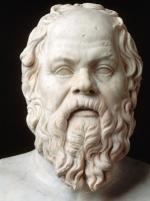|
This section contains 15,972 words (approx. 54 pages at 300 words per page) |

|
SOURCE: "The Good," in The Philosophy of Socrates, Macmillan, 1968, pp. 165-204.
In the following essay, Gulley explains that Socrates's teachings emphasize that "knowledge of the good is a necessary and sufficient condition of being good and of doing what is good," but that they do not explicitly state what "the good" is. Gulley examines the Socratic works of Plato, and Xenophon, as well as some references in Aristotle, in order to deduce a consistent understanding of "the good."
A. Introduction
… Socrates' method of analysis assumes that it is possible to determine with certainty what the good is. His moral paradoxes, with their intellectualist conception of moral knowledge, make the same assumption. But the analysis which yields the moral paradoxes does not yield a specification of the good. For the moral paradoxes themselves are in this respect non-informative. They tell us that knowledge of the good is a necessary...
|
This section contains 15,972 words (approx. 54 pages at 300 words per page) |

|


